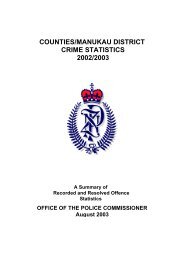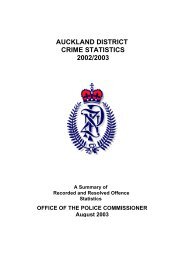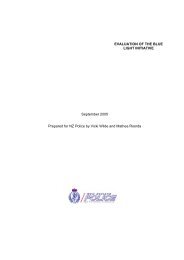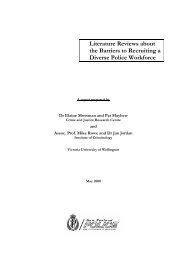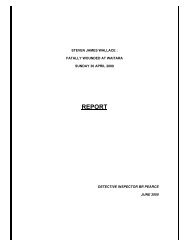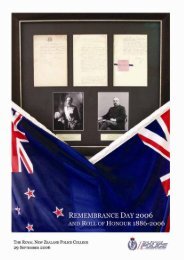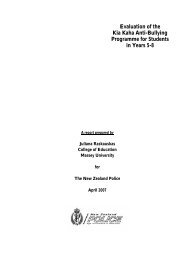Police Perceptions of Maori - Rethinking Crime and Punishment
Police Perceptions of Maori - Rethinking Crime and Punishment
Police Perceptions of Maori - Rethinking Crime and Punishment
Create successful ePaper yourself
Turn your PDF publications into a flip-book with our unique Google optimized e-Paper software.
'no responses' were also made by 12% to the item on using abusive language <strong>and</strong> by<br />
21% to the item on treating a suspect roughly. Respondents who commented said that<br />
this behaviour did not occur or only occurred in response to the behaviour <strong>of</strong> the<br />
<strong>of</strong>fender. Examples <strong>of</strong> the comments are:<br />
I am a pr<strong>of</strong>essional, this question is not within that parameter.<br />
This is not a matter <strong>of</strong> race. The police will treat <strong>of</strong>fenders, not suspects,<br />
roughly if the <strong>of</strong>fender treats them poorly.<br />
Finally there were two items where a sizeable number thought <strong>Maori</strong> were more likely<br />
to be responded to: nearly a third said that <strong>Maori</strong> were more likely to be suspected <strong>of</strong><br />
an <strong>of</strong>fence <strong>and</strong> nearly a half said that <strong>Maori</strong> were more likely to be stopped if seen<br />
driving a 'flash' car. On the other h<strong>and</strong>, a greater number thought that, even on these<br />
items, <strong>Maori</strong> <strong>and</strong> Caucasian were likely to be treated the same. A lot <strong>of</strong> <strong>of</strong>ficers were<br />
at pains to explain to us that factors other than the ethnicity <strong>of</strong> the <strong>of</strong>fender were more<br />
important in determining whether or not they responded in these situations. As one<br />
<strong>of</strong>ficer put it:<br />
You look for something out <strong>of</strong> place, like a beat up car in Remuera or a flash<br />
car in a poor area,<br />
The comments accompanying answers to this group <strong>of</strong> questions emphasised diverse<br />
perceptions <strong>of</strong> police behaviour in general. Some emphasised different responses<br />
depending on race:<br />
<strong>Police</strong> have preconceived ideas <strong>of</strong> different races.<br />
<strong>Police</strong> tend to be more aggressive towards other ethnic groups <strong>and</strong> they slag<br />
<strong>of</strong>f at them.<br />
<strong>Police</strong> respond in a negative way to ethnic groups as they have a monocultural<br />
view. They are predominantly white, middle class males.<br />
There are some fine members <strong>of</strong> police who are non <strong>Maori</strong> <strong>and</strong> who do not<br />
exhibit any signs <strong>of</strong> racism towards <strong>Maori</strong>. However, there are a significant<br />
number who range from having some racist attitudes to some who have<br />
extreme attitudes. The latter can cause immeasurable damage to the police as<br />
an organisation when dealing with <strong>Maori</strong> <strong>of</strong>fenders <strong>and</strong> complainants.<br />
Other comments emphasised equality <strong>of</strong> responses or that other factors were more<br />
important than ethnicity:<br />
People are mostly treated as individuals regardless <strong>of</strong> their race.<br />
Responses are made depending on the attitude <strong>of</strong> the person, not their<br />
ethnicity.<br />
Generally it depends on the individual concerned: their language, previous<br />
dealings with them, their reliability, their intelligence.<br />
15



